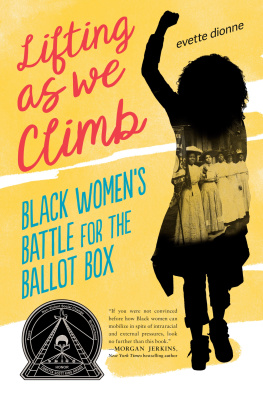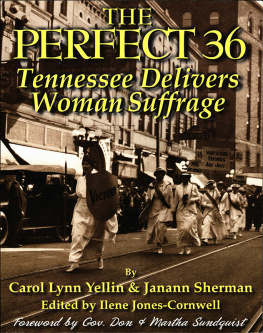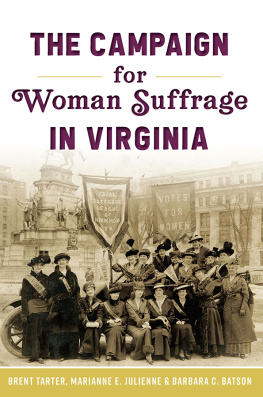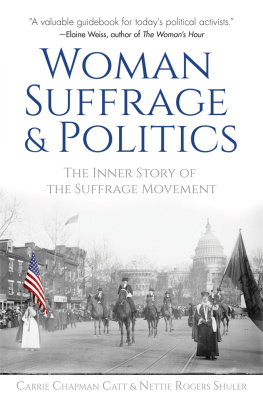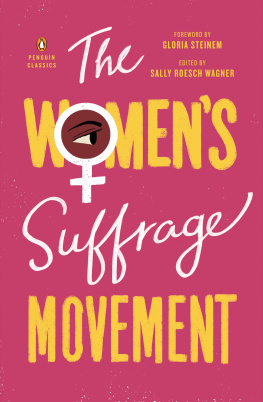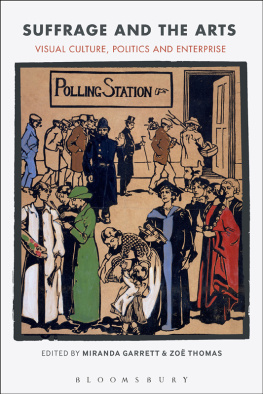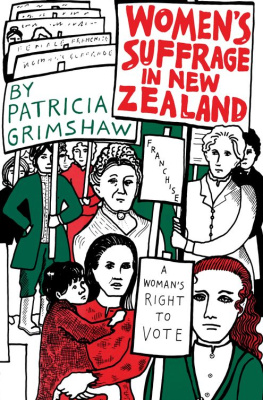
Praise for The Suffragents
Not all the suffragists who risked ridicule to march down Fifth Avenue in the big parades touting votes for women wore dresses. Brooke Kroeger meticulously documents the largely unsung role of men who publicly supported their wives, mothers, sisters, or lovers in the final dramatic decade of womens seventy-year battle for the ballot.
Linda J. Lumsden, author of Inez: The Life and Times of Inez Milholland
and Rampant Women: Suffragists and the Right of Assembly
Women need men to get the rights they deserve: after all, men had to vote to let women vote. Brooke Kroeger gives us the first history of the Mens League for Woman Suffrage, the Gentlemans Auxiliary of the womens movement. Eschewing the spotlight, they supported gender equality, as we all should, because its quite simply the right thing to do. With this gift, Kroeger gives us back a bit of our history.
Michael S. Kimmel, coeditor of Against the Tide: Pro-Feminist Men
in the United States, 17761990: A Documentary History
The Suffragents
Previous books by Brooke Kroeger
Nellie Bly: Daredevil, Reporter, Feminist
Fannie: The Talent for Success of Writer Fannie Hurst
Passing: When People Cant Be Who They Are
Undercover Reporting: The Truth about Deception
The Suffragents
How Women Used Men to Get the Vote
Brooke Kroeger
On the cover : Mens League Suffrage Parade delegation marches into Union Square, 1915 Suffrage Parade, New York City. (C. Catt Collection, Bryn Mawr College Library)
Published by State University of New York Press, Albany
2017 State University of New York
All rights reserved
Printed in the United States of America
No part of this book may be used or reproduced in any manner whatsoever without written permission. No part of this book may be stored in a retrieval system or transmitted in any form or by any means including electronic, electrostatic, magnetic tape, mechanical, photocopying, recording, or otherwise without the prior permission in writing of the publisher.
Excelsior Editions is an imprint of State University of New York Press
For information, contact State University of New York Press, Albany, NY
www.sunypress.edu
Production, Dana Foote
Marketing, Katherine Dias
Library of Congress Cataloging-in-Publication Data
Names: Kroeger, Brooke, 1949 author.
Title: The suffragents : how women used men to get the vote / by Brooke Kroeger.
Description: Albany : State University of New York Press, Albany, 2017. | Excelsior editions. | Includes bibliographical references and index.
Identifiers: LCCN 2016044034 (print) | LCCN 2017000548 (ebook) | ISBN 9781438466293 (hardcover : alk. paper) | ISBN 9781438466309 (pbk. : alk. paper) | ISBN 9781438466316 (e-book)
Subjects: LCSH: Mens League for Woman Suffrage (New York, N.Y.) | WomenSuffrageNew York (State)History.
Classification: LCC JK1896 .K57 2017 (print) | LCC JK1896 (ebook) | DDC 324.6/2309747dc23
LC record available at https://lccn.loc.gov/2016044034
10 9 8 7 6 5 4 3 2 1
Contents
Illustrations
A N I NTRODUCTION
C HAPTER 1
C HAPTER 2
C HAPTER 3
C HAPTER 4
C HAPTER 5
C HAPTER 6
C HAPTER 7
C HAPTER 8
C HAPTER 9
C HAPTER 10
A C ODA
Acknowledgments
I offer my gratitude:
To the able researchers who assisted at various points in this project: My students Maggy Donaldson, Mireia Triguero-Roura, Katie Whittaker, Kat Thornton, and Jesse Coburn, and our librarian Katherine Boss; the Long Island Collection Librarians at the East Hampton Library, Gina Piastuck and Andrea Meyer; and my friend, Marilynn Abrams. Alisha Stendecker, Emily Wishingrad, and Kiara Tringali provided great help via the Schuster Institute for Investigative Reporting at Brandeis University, where I am a Senior Fellow.
To the librarians and archivists who safeguard document and photographic material at the Library of Congress, at the Schlesinger Library of the Radcliffe Institute (Lindsey Bailey) and Houghton libraries at Harvard University, and in the special collections libraries at the New York Public Library (David Rosado), Vassar, Yale, Bryn Mawr, Dartmouth, Columbia (Jocelyn K. Wilk), Princeton, New York University, Brandeis, Rochester, the Lilly Library at Indiana University, Rice University Library, University of Houston Library, the Woodrow Wilson Presidential Library, the Alice Paul Institute, at the Library of Congress, the New-York Historical Society, the Museum of the City of New York, the Newberry Library, and at the public libraries of New York City, Troy, and Buffalo, the historical societies of Geneva, Ticonderoga, Keene, Lake George, and Rockland County, and elsewhere around the state and beyond. Special acknowledgment to director Dennis Fabiszak at the East Hampton Library. Newspaper repositories from Fulton History, the Library of Congresss Chronicling America, Newspapers.com, NewspaperArchive.com, and Proquest were essential in the process.
To Patricia OToole, Adam Vine, Clay Smith, Gioia Diliberto, Dinitia Smith, Antonia Petrash, Amy Shore, Shelley Stamp, Todd Coleman, Philippa Brophy, and Holly Hilliard for their support, knowledge, insight, and good counsel; to Michael S. Kimmel, for affirming my earliest impression of the Leagues unique value, to Alison MacKeen, Christoph Irmscher, Jen Balderama McDonald, Steve Wasserman, Clay Smith, and Adam Vine for astute responses to early drafts of the manuscript; to Ben Weinstein, Katy Dwyer, Gail Gregg, and Prianka Srinivasan for artful photographic assistance; to Geraldine Baum and Robert S. Boynton for help in articulating the scope of the project in brief.
To Heddi Siebel, James Marten, Harriet Todd, Susan Schwartz, Kenneth Florey, James Van Houten, and Nancy Cook for dipping into their personal files for historic or family photographs.
To New York University for giving me an academic home, the space, and support to pursue such projects, and the remarkable colleagues and students who have buoyed me over nearly two decades.
To Amanda Lanne-Camilli, Jessica Kirschner, Chelsea Miller, Dana Foote, Katherine Dias, and Pat Hadley-Miller at State University of New York Press; to graphic designer Amane Kaneko; and to Sue Morreale of Partners Composition for the care they took with this project.
To all the suffrage, mens history, biographers, and Woodrow Wilson scholars whose books and papers appear in the text and bibliography, or in citations in the notes of this book. All of them helped me make sense of so much of the rest of the material I gathered.
And, as always, to Alex Goren, the twenty-first-century embodiment of everything truly grand about manhood in relation to women, much in the mold of those who led the Mens League for Woman Suffrage, a subject that he and I, and so many others, had no notion of until now.
An Introduction
O n May 6, 1911, under perfect blue skies, ten thousand spectators lined both sides of Fifth Avenue from the curb to the building line for the second annual New York Suffrage Day parade. Somewhere between three thousand and five thousand marchers strode in a stream of purple, green, and white, from Fifty-Seventh Street to a giant rally in Union Square. Bicolored banners demarcated the groups by their worldly work as architects, typists, aviators, explorers, nurses, physicians, actresses, shirtwaist makers, cooks, painters, writers, chauffeurs, sculptors, journalists, editors, milliners, hairdressers, office holders, librarians, decorators, teachers, farmers, artists models, even pilots with steamboats painted on their banners. Womens work was the point. The New York Sun repeated the entire list at the top of its front-page story.


